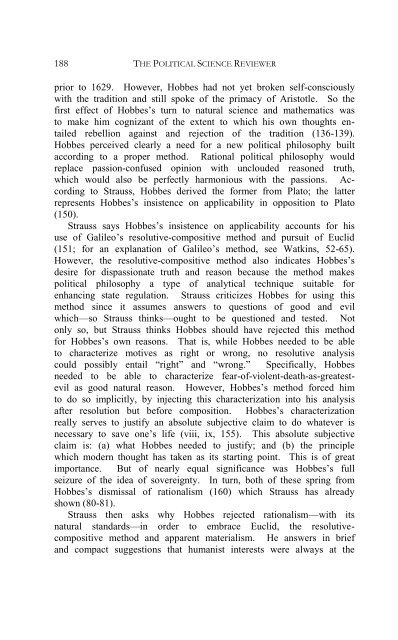Strauss and Watkins on Hobbes' Political Philosophy: A Review
Strauss and Watkins on Hobbes' Political Philosophy: A Review
Strauss and Watkins on Hobbes' Political Philosophy: A Review
You also want an ePaper? Increase the reach of your titles
YUMPU automatically turns print PDFs into web optimized ePapers that Google loves.
188 THE POLITICAL SCIENCE REVIEWER<br />
prior to 1629. However, Hobbes had not yet broken self-c<strong>on</strong>sciously<br />
with the traditi<strong>on</strong> <str<strong>on</strong>g>and</str<strong>on</strong>g> still spoke of the primacy of Aristotle. So the<br />
first effect of Hobbes’s turn to natural science <str<strong>on</strong>g>and</str<strong>on</strong>g> mathematics was<br />
to make him cognizant of the extent to which his own thoughts en-<br />
tailed rebelli<strong>on</strong> against <str<strong>on</strong>g>and</str<strong>on</strong>g> rejecti<strong>on</strong> of the traditi<strong>on</strong> (136-139).<br />
Hobbes perceived clearly a need for a new political philosophy built<br />
according to a proper method. Rati<strong>on</strong>al political philosophy would<br />
replace passi<strong>on</strong>-c<strong>on</strong>fused opini<strong>on</strong> with unclouded reas<strong>on</strong>ed truth,<br />
which would also be perfectly harm<strong>on</strong>ious with the passi<strong>on</strong>s. Ac-<br />
cording to <str<strong>on</strong>g>Strauss</str<strong>on</strong>g>, Hobbes derived the former from Plato; the latter<br />
represents Hobbes’s insistence <strong>on</strong> applicability in oppositi<strong>on</strong> to Plato<br />
(150).<br />
<str<strong>on</strong>g>Strauss</str<strong>on</strong>g> says Hobbes’s insistence <strong>on</strong> applicability accounts for his<br />
use of Galileo’s resolutive-compositive method <str<strong>on</strong>g>and</str<strong>on</strong>g> pursuit of Euclid<br />
(151; for an explanati<strong>on</strong> of Galileo’s method, see <str<strong>on</strong>g>Watkins</str<strong>on</strong>g>, 52-65).<br />
However, the resolutive-compositive method also indicates Hobbes’s<br />
desire for dispassi<strong>on</strong>ate truth <str<strong>on</strong>g>and</str<strong>on</strong>g> reas<strong>on</strong> because the method makes<br />
political philosophy a type of analytical technique suitable for<br />
enhancing state regulati<strong>on</strong>. <str<strong>on</strong>g>Strauss</str<strong>on</strong>g> criticizes Hobbes for using this<br />
method since it assumes answers to questi<strong>on</strong>s of good <str<strong>on</strong>g>and</str<strong>on</strong>g> evil<br />
which—so <str<strong>on</strong>g>Strauss</str<strong>on</strong>g> thinks—ought to be questi<strong>on</strong>ed <str<strong>on</strong>g>and</str<strong>on</strong>g> tested. Not<br />
<strong>on</strong>ly so, but <str<strong>on</strong>g>Strauss</str<strong>on</strong>g> thinks Hobbes should have rejected this method<br />
for Hobbes’s own reas<strong>on</strong>s. That is, while Hobbes needed to be able<br />
to characterize motives as right or wr<strong>on</strong>g, no resolutive analysis<br />
could possibly entail “right” <str<strong>on</strong>g>and</str<strong>on</strong>g> “wr<strong>on</strong>g.” Specifically, Hobbes<br />
needed to be able to characterize fear-of-violent-death-as-greatest-<br />
evil as good natural reas<strong>on</strong>. However, Hobbes’s method forced him<br />
to do so implicitly, by injecting this characterizati<strong>on</strong> into his analysis<br />
after resoluti<strong>on</strong> but before compositi<strong>on</strong>. Hobbes’s characterizati<strong>on</strong><br />
really serves to justify an absolute subjective claim to do whatever is<br />
necessary to save <strong>on</strong>e’s life (viii, ix, 155). This absolute subjective<br />
claim is: (a) what Hobbes needed to justify; <str<strong>on</strong>g>and</str<strong>on</strong>g> (b) the principle<br />
which modern thought has taken as its starting point. This is of great<br />
importance. But of nearly equal significance was Hobbes’s full<br />
seizure of the idea of sovereignty. In turn, both of these spring from<br />
Hobbes’s dismissal of rati<strong>on</strong>alism (160) which <str<strong>on</strong>g>Strauss</str<strong>on</strong>g> has already<br />
shown (80-81).<br />
<str<strong>on</strong>g>Strauss</str<strong>on</strong>g> then asks why Hobbes rejected rati<strong>on</strong>alism—with its<br />
natural st<str<strong>on</strong>g>and</str<strong>on</strong>g>ards—in order to embrace Euclid, the resolutive-<br />
compositive method <str<strong>on</strong>g>and</str<strong>on</strong>g> apparent materialism. He answers in brief<br />
<str<strong>on</strong>g>and</str<strong>on</strong>g> compact suggesti<strong>on</strong>s that humanist interests were always at the
















